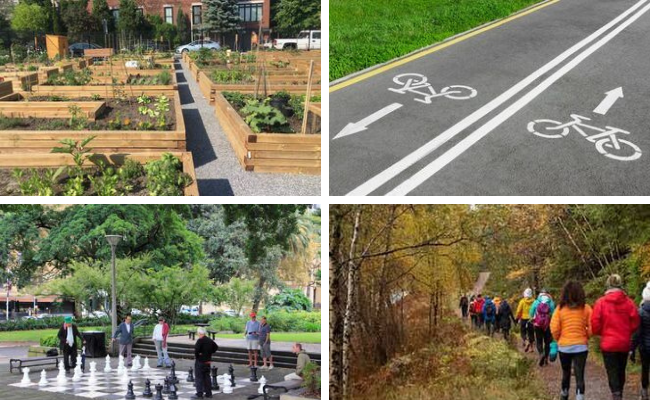PROJECTS
HMI of Sedona and Northern Arizona

Healthy World Sedona
Current community based projects
1. National Coaching model – research project
We take pride in helping communities develop the capacity to take care of their own health even after we have left. We achieve this by training community coaches who will guide others in the community on how to attain brain health by marshalling the resources of the community and with the unique characteristics, and resources of the community in mind. But the coaches / facilitators / leaders will do so much more than coaching. They will help lead the community in attaining resources and training other trainers thus creating a perpetual and ever growing fountain of health knowledge and capacity building. We would love for you and your friends to take the lead in this endeavor for your community and help us help you build a mind healthy community.
2. African American Faith based projects – research project
We are currently leading the most important and innovative brain health research program in the country. Our research and sustainable project is centered in African American Churches in Los Angeles, and NYC, and is about to grow nationally. We believe this project is going to change the landscape of brain health forever, especially in the communities that have twice the prevalence of dementia and stroke. This project is not only the first of its kind with regards to community based participatory research, but also one that will leave permanent infrastures in place for decades to come. We are proud to have won the National Academy of Medicine innovator award for this project, and hope to get your support (financial, resources, & volunteers) to expand it nationally.
3. Women’s health empowerment program
Over the last few decades one fact that has dominated the world of public health is that if you want your health project to succeed invest in the women of the community. In fact, it has been shown that a dollar spent on women in the community is four times more effective than any other investment in the community. To that end we are investing in community based women led research and public health leadership programs through out the country and the world. We are also focusing on how to use healthcare as a means of empowering women in communities where they lack power and resources.
4. Working on building local community based projects
By translating what we know through research into actionable processes it’s possible to establish a public health approach at both micro and macro levels. Our focus is on individuals and communities. We recognize the challenges in creating behavior change, especially in lower socioeconomic, high risk communities with reduced opportunities for healthy foods, exercise, and positive socialization and increased stressors. Through a grassroots approach, integrating community leaders and neighborhood liaisons/influencers, technologically based resources including fun incentives, and public policy initiatives to drive improved access, we plan to offer access to MIND Health based improvements for all residents. HMI will introduce a Community Based Participatory Research (CBPR) process for reaching, engaging, and fostering scalable and researchable behavioral shifts within people through their communities.
Through a tiered approach via identified groups in self-selected communities, HMI will:
- outreach via community groups
- churches
- community centers
clubs and associations
- establish relationships with influencers
- politicians
- elders and thought leaders
- community celebrities
HMI will also utilize technology to target and access communities digitally, with the purpose of building relationships with:
- individuals (grouped by demographics, interests, or hobbies)
- social media (Facebook, Twitter, Instagram, etc)
- groups formed around specific topics like Alzheimer’s
- online clubs and associations
- forums and digital communities
HMI will work directly with each community through their invested leadership to identify specific needs, determine areas of scarcity vs. current positive resources, and establish community outcomes and determinants of impact. HMI will lead the research/ interventions based on each community’s pain points. Data secured through this research is shared with interested researchers globally. At the core of HMI’s ability for data sharing is a web platform currently being built that will allow easy and secure, HIPPA compliant, data sharing that is not only fast but borderless. This site will also provide communities with their own webpage link, allowing community members to access community specific information, resources, timely research, and two-way communication between community leadership and participants.
Also integrated into the process and research is the use of marketing and social media technology to increase awareness of and drive engagement in traditional, in-person events and workshops. Through a fun, gamified approach, we will encourage increases in self-identified needs such as vegetable intake, exercise, mindfulness and meditation activities, sleep modification, and increased socialization.
HMI will initiate new research and access data from which new potential protocols can be developed and shared by scaling our communities and opening HMI chapters over time.
New HMI chapters will be prioritized based on interested parties completing orientation and training on the Mind Health protocol and having sufficient experience within health and wellness fields. Once the process is in place and initial outcomes are achieved, HMI anticipates communities will be positioned to take over and allow HMI staff to provide periodic coaching rather than a more hands-on leadership role in project implementation and data collection. We will conduct both summative and formative evaluations. Success will be determined by outcome metrics as defined by communities and focused on greater awareness and end stage (disease) measures. HMI’s researchers will conduct these analyses, as well as share the results among all HMI partners.
Community based projects in the past
1. Beach Cities Health District district wide research project
For three years we worked with the Beach Cities Health district to develop a community based brain health intervention research project. We were able to recruit over 70 individuals that were involved in a weekly intervention program that included cooking sessions, didactics, and Weekly Q&As. This program was incredibly popular and resulted in educating and training a significant number of participants to not only better their own health but those of others around them. The program now continues as an intervention program through the district.
2. Sedona coaching project
We worked with a team of lifestyle specialists in Sedona to recruit coaches who in turn recruited up to fifteen trainees who wanted to improve their brain health. They were trained through the MIND Health protocol and then empowered to bring transformative change into their own and their community’s health. Through the journey we were also able to collect data on lifestyle and brain capacity. The program has been a unique model that provided us with tremendous lessons that can now be translated to other communities.
Secondary database analysis
We have always recognized the importance of research and especially secondary database analysis as a preliminary step before implementing any intervention programs. To that end we have been involved in dozens of database-driven research programs in the past and will continue our work in secondary database analysis. We also welcome those with a research background to help us accelerate our database analytic program.
Spreading the great news
For us, spreading valid science based and translationally plausible information is probably the most important work we can do. In a world where social media has become the bastion of good and bad information and can be the source of profound chaos, helping promote valid information is the most important and central work for any scientist. We hope to lead the world of scientific communication, especially as it pertains to brain health, and we hope to do so through the media below:
- Local
- Social Media
- Local policy makers
- National
- HMI Conference
- National organization meetings
- TV
- Social Media
- National Policy makers
Establishing a national Healthy Minds Think Tank (HMTT)
For the last few decades we have been trying to solve many of the brain diseases that have devastated humanity, diseases like Alzheimer’s, Parkinson’s disease, Stroke, depression, anxiety, PTSD, etc. But much of the effort has been at the point of disease. We have focused on treating diseases once an individual develops the disease. Though this approach is important and must continue, we must also start focusing on prevention and a completely different approach to disease. The new approach would involve the communities that are affected by these diseases, and use the knowledge of the community to understand the means of addressing the factors that may contribute to the said diseases. This approach not only provides us information about the nature and contributors to the given diseases, but also translational models of the intervention that are most likely to work in the different communities. In order to succeed in this massive new direction we need to establish
Marshalling resources (TBD)
One of the most important tasks for our team is to help communities marshall resources for brain healthy living. Though education, and coaching are extremely important in helping individuals and communities achieve optimal brain health, without resources such as equipment, computers, exercise equipment, community gardens, walking and biking friendly parks and sidewalks, resources for meditation, and other resources the chance of creating community wide brain health is nominal.

